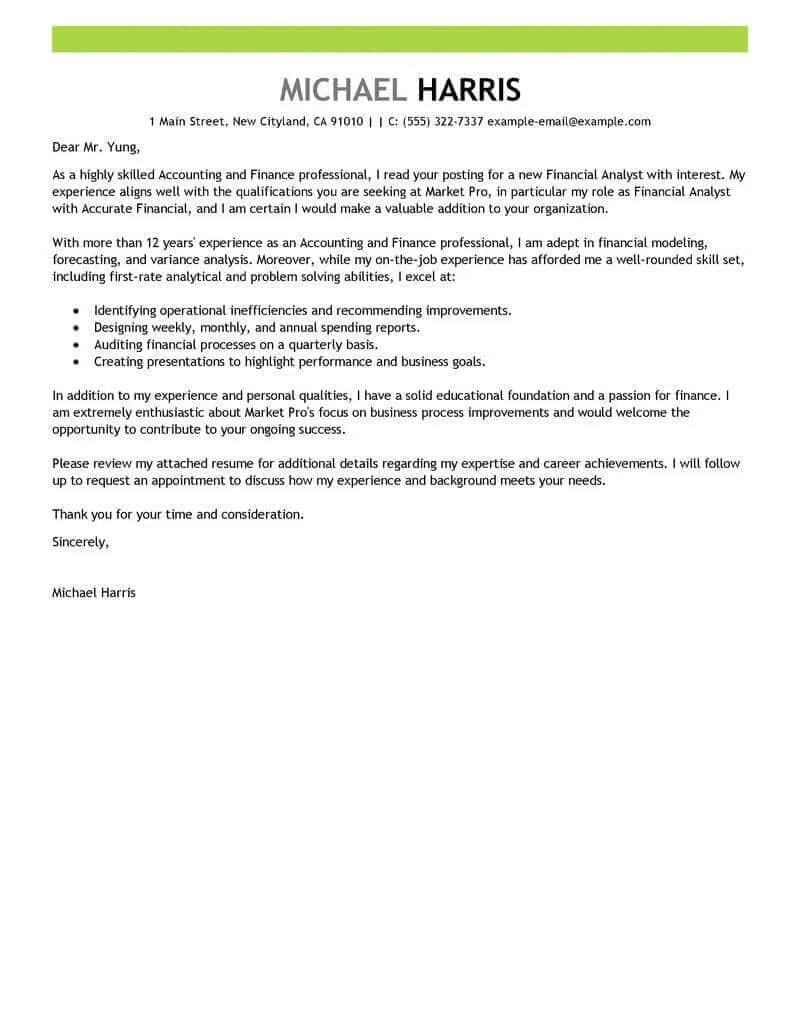Why a Corporate Finance Cover Letter Matters
In the competitive world of corporate finance, a well-crafted cover letter is your first opportunity to make a strong impression. It’s not just a formality; it’s a crucial tool that can significantly increase your chances of landing an interview. Unlike a resume, which provides a factual overview of your experience, the cover letter allows you to tell a story and connect your skills and experiences directly to the specific requirements of the role. It’s where you can demonstrate your passion for corporate finance, your understanding of the company’s needs, and your ability to contribute meaningfully. A compelling cover letter sets you apart from other applicants, highlighting your unique value proposition and making the hiring manager eager to learn more about you.
Highlighting Your Financial Skills
Your cover letter should immediately showcase your financial acumen. Corporate finance roles demand a solid foundation in financial principles. When writing your cover letter, focus on the skills that are most relevant to the job description. Begin by clearly stating your understanding of financial statements like income statements, balance sheets, and cash flow statements. Mention any experience you have in areas like budgeting, forecasting, and financial planning. Quantify your achievements whenever possible. For example, instead of saying “Improved budgeting processes,” say “Implemented a new budgeting system that reduced expenses by 15%.” This kind of detail gives potential employers a clear picture of your abilities and the impact you can make in their organization.
Financial Analysis and Modeling Prowess
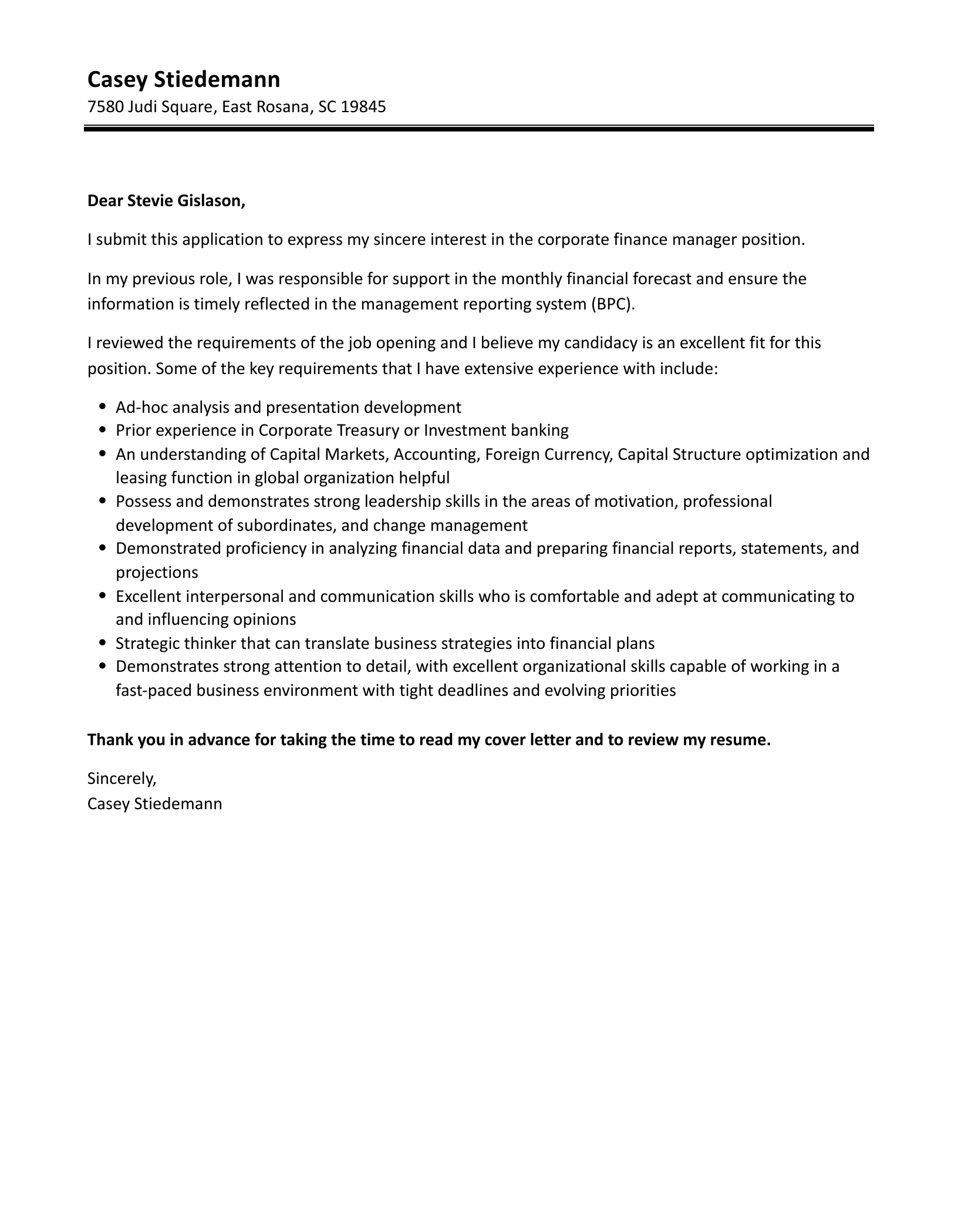
Financial analysis and modeling are at the heart of corporate finance. Your cover letter should demonstrate your proficiency in these areas. Highlight your ability to build and interpret financial models for valuation, forecasting, and decision-making. Mention specific software you are proficient in, such as Excel (including advanced functions like pivot tables, VBA), and any experience with financial modeling software like Bloomberg or Cap IQ. Discuss your experience in performing financial statement analysis, including ratio analysis and trend analysis. If you have worked on projects that involved complex financial modeling, such as mergers and acquisitions or capital budgeting, be sure to describe those experiences in detail, emphasizing the outcomes and your role in achieving them.
Key Metrics and Performance Indicators
Demonstrate your familiarity with key performance indicators (KPIs) that are central to corporate finance. Mention your experience analyzing and interpreting metrics like Return on Equity (ROE), Return on Assets (ROA), Earnings per Share (EPS), and free cash flow. If you have experience using these metrics to assess business performance, make sure to include it. Detail how you have used these metrics to make informed financial decisions, identify areas for improvement, or drive strategic initiatives. Your ability to understand and leverage these KPIs will be a strong signal of your value as a financial professional.
Demonstrating Deal Experience
If you have experience in mergers and acquisitions (M&A), capital raising, or other deal-related activities, be sure to highlight them prominently in your cover letter. These experiences demonstrate a high level of financial skill and the ability to manage complex transactions. Describe your role in any deals you’ve participated in, including your responsibilities, the stages of the deal you were involved in, and the outcomes. Even if your role was supporting rather than leading, mention it. For example, if you prepared due diligence materials or financial models for an M&A transaction, explain the scope of your work and the contributions you made to the team. Be specific about the deal size, the industry, and any unique aspects of the transaction.
Mergers and Acquisitions (M&A) Experience
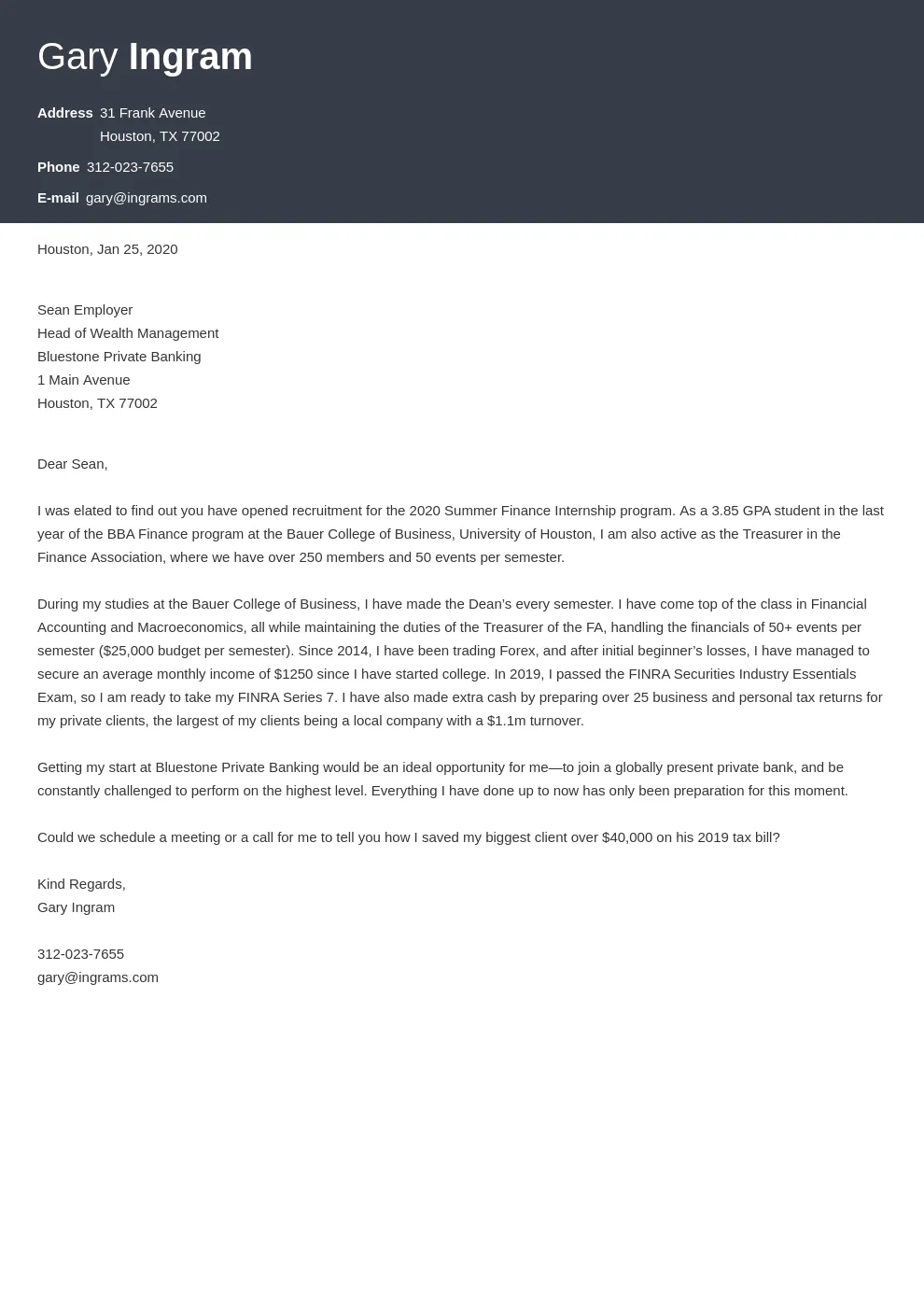
M&A experience is highly valued in corporate finance. Showcase your knowledge of the M&A process, including deal origination, due diligence, valuation, negotiation, and closing. Explain the size and type of deals you have worked on. Emphasize the tools and techniques you have used in the M&A process, such as discounted cash flow analysis, precedent transactions, and leveraged buyouts. Mention the roles you’ve played on M&A teams – whether it was financial modeling, market research, or coordinating with legal and accounting teams. If you contributed to successful deal closings, make sure to include that and quantify your impact whenever possible.
Showcasing Your Communication Skills
Excellent communication skills are vital in corporate finance. Your cover letter should prove that you are proficient in written and verbal communication. Corporate finance involves interacting with a variety of stakeholders, from senior management to external investors. Your cover letter should reflect your ability to convey complex financial information in a clear, concise, and compelling manner. Demonstrate your ability to create concise and persuasive presentations, reports, and financial models. Show your capacity to explain intricate financial concepts to non-financial professionals. Highlight how you have effectively communicated with a wide range of stakeholders, whether through presentations, memos, or email.
Effective Written Communication
Focus on your written communication skills. Be clear, concise, and professional. Avoid jargon and overly complex sentence structures. Use active voice whenever possible. Make sure your cover letter is free of grammatical errors and typos. Have a colleague review your cover letter for clarity and accuracy before submitting it. You can also show off your writing skills by highlighting experiences where you have prepared financial reports or presentations. Make sure that the tone of your cover letter matches the requirements of the role and the culture of the company.
The Importance of a Strong Resume
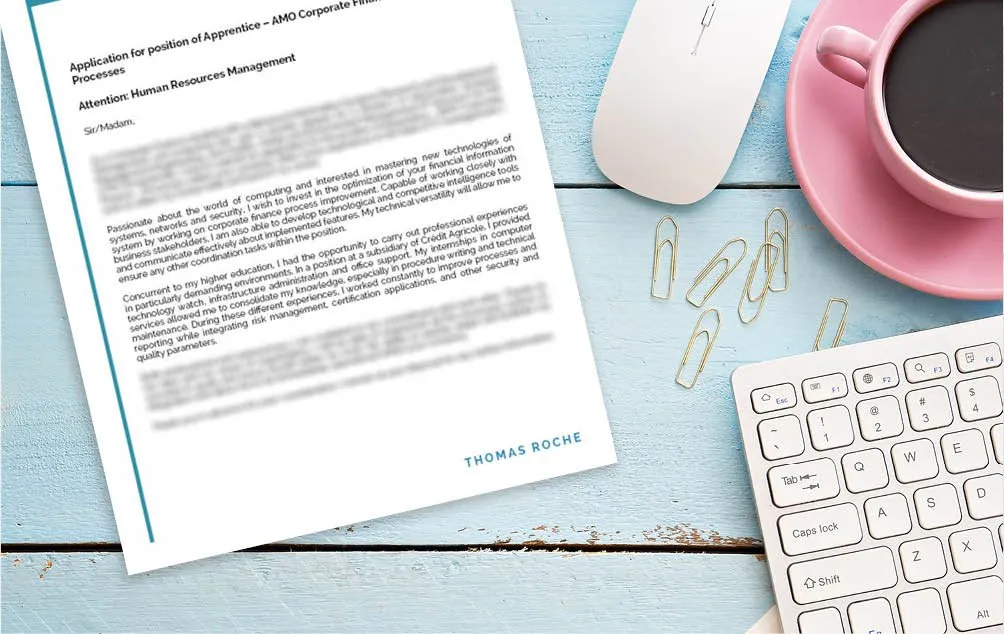
Your resume is a companion to your cover letter, providing a detailed overview of your professional journey. Your cover letter should complement your resume and entice the reader to review it. Make sure your cover letter and resume use the same keywords and highlight the same key skills and achievements. Ensure that all the information in your resume is accurate and up-to-date. Your resume should include a summary of your professional experience, skills, education, and relevant achievements. Customize your resume to match the requirements of each job you apply for. Make sure it is easy to read, well-organized, and free of errors.
Structuring Your Cover Letter
A well-structured cover letter makes a strong impression on the reader. It should follow a standard format that includes a professional heading, a compelling opening paragraph, a body that highlights your skills and experiences, and a confident closing paragraph. Include your contact information at the top of the letter, along with the date and the hiring manager’s name (if you know it). The opening paragraph should immediately grab the reader’s attention and state the position you are applying for. The body paragraphs should provide details about your skills and qualifications. The closing paragraph should express your enthusiasm for the opportunity and your readiness for an interview.
Crafting a Compelling Opening
The opening paragraph is your opportunity to grab the reader’s attention. Avoid generic openings. Instead, immediately state the position you are applying for and express your enthusiasm for the opportunity. Briefly summarize your most relevant skills and experiences, and explain why you are excited about the company. You can also mention something that resonated with you in the job description, or a recent achievement. Try to tailor the opening to the specific role and company. The goal is to make the reader want to continue reading.
Highlighting Relevant Achievements
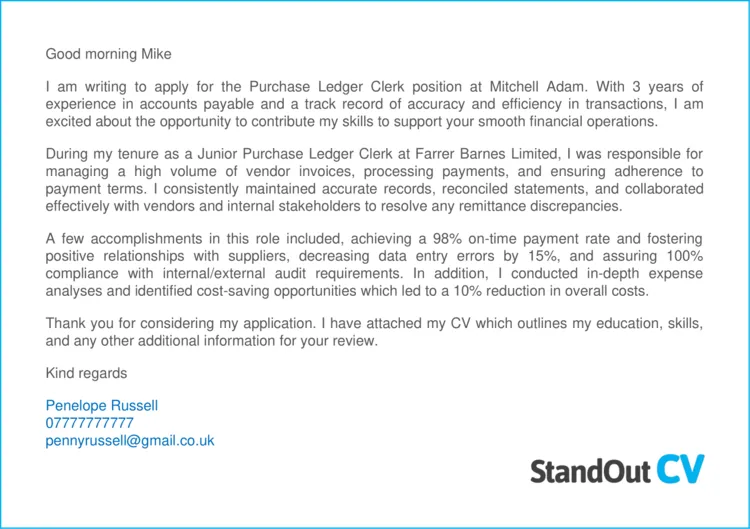
In the body of your cover letter, highlight your most relevant achievements, quantifying your contributions whenever possible. Instead of just listing your responsibilities, describe the impact you had on previous projects or roles. Use the STAR method (Situation, Task, Action, Result) to describe your accomplishments. For instance, instead of stating that you “Managed a budget,” you can explain the situation, what you were asked to do (task), what actions you took, and the results you achieved. This approach makes your cover letter more compelling and shows employers the value you can bring to their organization.
Closing with Confidence
Close your cover letter with a confident and professional statement. Reiterate your interest in the position and express your eagerness to discuss your qualifications in an interview. Thank the hiring manager for their time and consideration. Include a call to action, such as, “I look forward to hearing from you soon.” Proofread your entire cover letter one last time before submitting it. Your closing paragraph should leave a lasting positive impression, and make the reader believe that you are the best candidate for the job.
